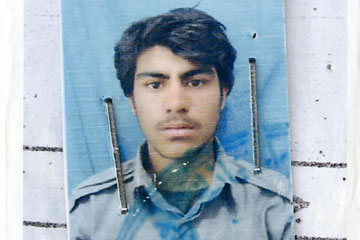
This photocopy of an image of Abdul Razaq, the killer of the three Marines, was given to the writer by a Marine in Helmand.
(7 of 12)
Abdul Razaq and Asadullah deploy north to Sangin and then on to Puzeh, moving into a building immediately next door to the mud-brick base of Marine Special Operations Team 8133. The post is rural and traditional. No asphalt roads, many small mosques. The compounds are separated by an alley, blocked at both ends.
Team 8133's square-jawed leader is Matt Manoukian, a 29-year-old U.S. Marine captain from Los Altos, Calif. He is known locally as Captain Haider, a transliteration of the Arabic word for lion. He is learning a little Pashtu and living as close to the Afghans as anyone in the coalition military does. Asadullah likes this Captain Haider and his men, who bum him smokes as they walk the village, often without body armor, sometimes even wearing shalwar kameez (which Marines often call a "man dress"). Captain Haider's mission, part of Village Stability Operations writ large, is to finesse village politics well enough to develop and support an Afghan Local Police (ALP) force.
Human Rights Watch takes issue with the name. "[It] is a misnomer," its 2011 report reads, "as the ALP is not really a police force." The ironic title of this report is "Just Don't Call It a Militia." Asadullah and Abdul Razaq--as Afghan National Police officers--are there to connect with these Afghan Local Police. The hope is to draw them into the government despite its near total absence in the area. Team 8133 is one of successive U.S. units making the government's case by attempting to clear Taliban and engaging in low-level development: holding shuras--or community meetings--cleaning up the local school, supporting literacy. If Abdul Razaq were literate, he could read this point about the Marines in a recent Afghan army manual: "9. THEY ARE NOT OCCUPIERS; THEY ARE HERE TO HELP."
Whether or not occupiers is the appropriate word, accepting help can be understood only in terms of joining or not joining. And by the time Abdul Razaq is learning the alphabet next door to the Marines in Puzeh, he has already joined the government, left, rejoined, left and joined again.
One day in their Puzeh station, Asadullah hears Hamidullah and Abdul Razaq talking about marriage. Abdul Razaq wants to get engaged and surprises Asadullah not long after by asking for his help--not only for a loan but also to vouch for him with the girl's father when the time comes. It seems to Asadullah that Abdul Razaq will have a hard time finding a wife. He is poor. And he doesn't talk much. But, the lieutenant thinks, he's not bad at his job. Always shaves, keeps his uniform clean. Not a particularly good marksman, but he can shoot under fire. They've done it together, attacked by Taliban.
You find the daughter, Asadullah tells him, and I'll help.
